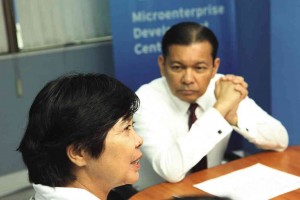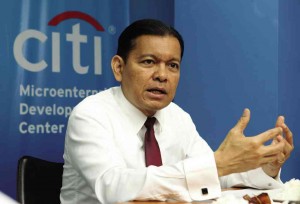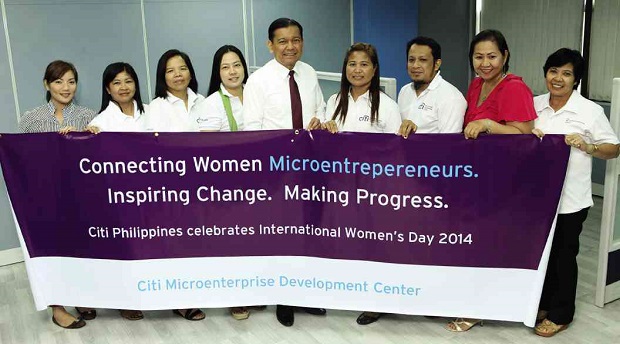Women’s traditional role helps make them good entrepreneurs
For Batara Sianturi, country officer of Citibank Philippines, the success of many Filipino women in small and medium scale enterprises was not at all surprising.
Sianturi, who had a roundtable discussion with some micro-entrepreneurs, as an early observance of International Women’s Day, which was marked March 8, said women had been traditionally multi-taskers—balancing responsibilities in and outside their homes.

ARGABIO, a land reform beneficiary, talks about how she has diversified from just planting sugar cane.
Noting that the Philippines had “a robust microenterprise and microfinance industry comprised of mostly women,” he said their traditional role had taught them discipline, which enabled them to do almost single-handedly all the tasks their small businesses needed to grow. “They are bosses, finance managers and sales and marketing people,” he said.
As the women, who had been recognized in the annual Citi Microentrepreneurship Awards, told the Citi official their struggles and the obstacles they had to hurdle to keep their businesses alive, it was evident they also had determination, commitment, tenacity and resilience.
The women—Maria Guidella Argabio, Marylyn Cleto, Regina Paller, Adora Aceron, Maria Leonora Paez, Seny Constancia Larida and Lucia Brondal—with Jose Ty, representing his wife Necy, at the roundtable, were “students” of the Citi Microenterprise Development Center (CMDC), which offers entrepreneurship training for high-potential micro business owners, as well as coaching and mentoring.
Funded by Citi Foundation, CMDC has trained nearly 1,000 participants over the last three years. It received recently the Social Empowerment award from the Asia Responsible Entrepreneurship Program.
The entrepreneurs talked about the challenges they had to overcome.

SIANTURI says the Philippines is one of the most progressive countries when it comes to women empowerment.
A former overseas Filipino worker, who found she was earning more running her own business than she did working abroad, had to come up with a low-priced version of her tiger grass brooms in response to competition from other producers.
One woman from the Visayas had to cope with the destruction caused by Supertyphoon “Yolanda.”
A manufacturer of mountaineering gear had to deal with poor and cheap imitations of their products.
Some of the women talked about how their children did not seem to share their commitment to the business and would rather pursue other career paths.
Although the microentrepreneurs managed or were managing to deal with the challenges they faced and had steered their ventures into profitability and stability, they said being at CMDC showed them they still had a lot to learn. Aceron said participating in the CMDC program “was one of the best decisions I made. I thought I already knew many things but from the first day of the training, I quickly found out there was so much more to learn and that some things I was doing had to be changed.”
One important lesson for the microentrepreneurs was the need to keep lists—of inventory, expenses, income, etc.—as part of good management.
One woman, who lost several thousand pesos to a family friend, said she realized unquestioning trust, especially when money was involved, was not good for business. She learned that she had to pay closer attention to the finance side.
Hearing the entrepreneurs talk about how they wanted their business to grow not just for themselves and their families but for their employees, Sianturi told the women they were “all change makers for the success and impact that you have made in increasing income and job generation for your communities. You also represent the best of what the microfinance industry has to offer.”
He encouraged the entrepreneurs to be servant-leaders, freely sharing their knowledge and decision-making duties with subordinates and empowering employees to make changes and promote innovation within their organizations.
“Servant-leaders put their people first … I believe that many of you do this—providing jobs to people in your community, your families and really assisting them [despite the many challenges and hiccups] to prosper and grow,” the Citi country officer said.
He stressed creativity and discipline were needed for sustainability, as he warned that the journey was still long for the microentrepreneurs. A lot of learning would be needed and there would be ups and downs.
Now on its fourth year, CMDC aims to reach another 800 beneficiaries with training and coaching programs. It also seeks to expand beyond Metro Manila to cover Palawan, North and South Luzon, as well as Visayas and Mindanao.















